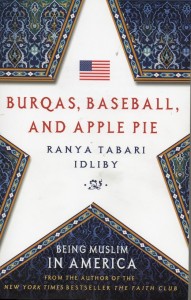Book Review: Burqas, Baseball and Apple Pie by Ranya Tabari Idliby
Disclaimer: I received this book in a Goodreads giveaway on the premise that I would review it. My copy was an Advance Reader’s Edition, and there may be changes in the final product.
A fairly large percentage of the Goodreads giveaways I enter are for my favorite genres or books by authors I have heard are good. But I try to every so often pick a book a little outside my comfort zone. You can’t widen your worldview if you don’t stretch your mind every so often. And so this book.
Ranya Tabari Idliby is one of the three authors of The Faith Club, here speaking about her own examination of what it means to be both American and Muslim in the present day. This is perhaps harder than it should be, as there is a vocal minority in the United States that believes that Muslims cannot be truly American, as their ancestors believed one could not be Catholic and truly American, or black and truly American.
She writes of her family history, how her father lived in America for many years and she chose to emigrate from Kuwait and become a naturalized citizen. And how her children were born American citizens, but on the day her daughter started kindergarten, 9/11 happened, and America’s attitude towards Muslim people harshened overnight.
This shook the author into really examining her faith; she’d grown up Muslim because her parents were, and had to attend religion classes, but never really thought about what it meant. How could her supposed co-religionists believe that killing hundreds of people in terror acts was at all supported by Islam?
Some subjects covered in this book include the diversity of Islam (there’s no Muslim Pope, despite the Saudi Arabians’ attempts at defining their version of Islam with its Seventh Century cultural values as the “one true Islam,”) the anti-woman doctrines of certain strains of Islam, the meaning of fatwa, conflict between being patriotic to America and wanting to support the athletic efforts of fellow Muslims, false pictures of American Muslims being propagated by media and interreligious marriage.
If you have been wondering where the moderate and progressive Muslims are, here is one of them. Quite a bit of what Ms. Idliby has to say is sensible and worth looking at. One possible weakness of the book is that it is very of the “now” and is likely to become dated very quickly.
There are photos in the middle, but the ARE did not have an index or bibliography.
Recommended to people interested in current events and progressive Islam.

